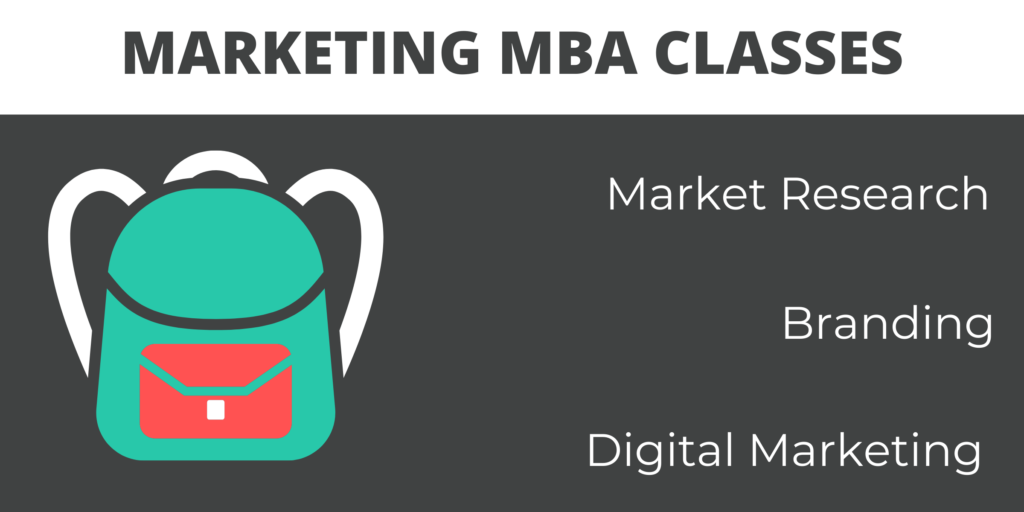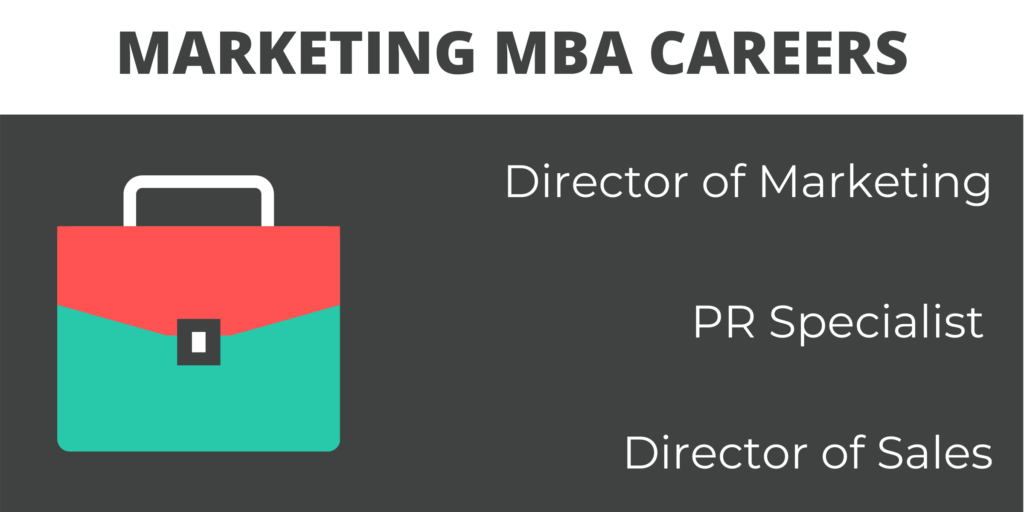A Master’s of Business Administration (MBA) is designed to prepare students for success in the world of business. If this sounds broad that’s because it is. But it is broad by design. Business–while infinitely dynamic and variable across contexts–functions accordingly to set principles, economic trends, and market ecosystems. An MBA degree program will build this fundamental understanding of business, so that students can thrive in any of their business pursuits.
The second major focus of an MBA is the focus on business leadership and management strategies. Knowing the correct theories and fundamental business principles of success will amount to little if business professionals are not able to implement their theory into practice. Business is rarely–if ever–a solitary endeavor, and so an MBA enforces the cruciality of proper business management applicable in the standard organizational formats of business.
An MBA of Marketing is unique in that it focuses curriculum to bring students up to a Master’s level education in marketing positioned within the context of advanced business administration education. In other words, students will learn not only how to become high-end marketing professionals, but they will learn how to leverage the various techniques of their profession to strengthen the pillars of business administration.
To learn more about business degrees consider these resources:
- What Can I Do with a Business Degree?
- How Advanced Does my Business Degree Need to Be to Get a Good Job?
- What Are the Highest Paying Entry-Level Jobs in Business?
- How Can I Prepare for a Business Degree While Still in High School?
- How Fast Can I Complete a Bachelor’s of Business Online?
- What are the Benefits of a Degree in Business Analytics?
- What are the Benefits of Pursuing a Degree in Business?
- What are the Easiest Degrees to Get in Business?
- What are the Easiest Graduate Degrees to Get in Business?
- Top 10 Highest Paying Business Careers
- Top 10 Undergraduate Business Schools
- Top 10 Affordable Online Bachelor’s Degree in Business Administration
- 15 Top Degrees for Highest Paying Business Degrees
Distinctions between Traditional MBA and Marketing MBA

MBA of Marketing programs function according to the idea that a business with strong marketing is a strong business, so much so that pursuits of business and administration are enhanced by marketing efforts and marketing efforts are enhanced by strong business administration. In a Marketing MBA program, students will cover the concepts of business leadership and management within the context of marketing operations.
While a traditional MBA program will certainly cover elements of the marketing profession and emphasize its value to overall business pursuits, traditional programs do not employ marketing-focused curriculum as a core pillar of business administration, rather traditional programs will focus more on the administrational and managerial concerns of business operations. The extent to which an MBA program emphasizes marketing however, will ultimately depend on the particular program’s curriculum.
Additional Resources on MBAs:
- Top 25 Online MBA Programs
- Top 50 Affordable Online MBA Degrees
- Top 50 MBA Scholarships
- Is it Useful to Have an MBA if You Want to Get into an Administrative Position
- Is Focusing on IT in an MBA Program a Common Thing?
- Is it Possible or Recommended to Complete an MBA in a Year?
- Is it True that Companies Might not Hire You to Avoid Paying Higher Salaries to Someone with an MBA?
- Which is Better to Take as Part of my MBA Application: GRE or the GMAT?
- Highest Paying MBA Careers
- Highest Paying MBA Degrees
- At What Point or Age is it Best to Pursue an MBA?
- Do I Need to Know my MBA Specialty Before Beginning Classes?
- Do I Need to Specialize in my MBA Program?
- Highest Paying Degrees in Business
- Top 50 Online Business Degrees
- 50 Best Scholarships for Business Degrees
What is a Typical Marketing MBA Curriculum?
The typical Marketing MBA Curriculum will cover the core concepts of a traditional MBA program:
- Accounting
- Business Development
- Branding
- Channel Development
- Economics
- Finance
- Forecasting and Modeling
- Human and organizational performance
- Marketing
- Operations
- Operations Management
- Strategy
- Sales Force Management
But what is unique about a Marking MBA is that each of these areas will be covered within the context of marketing efforts–if there is a relevant and meaningful connection to be made. Additionally a Marketing MBA curriculum will dive more deeply into more specialized area of marketing education:
- Advertising Strategy
- Advertising Budgeting & Management
- Brand – Market Interaction
- Digital Marketing
- International Marketing
- Marketing Channel Development
- Marketing IT
- Marketing Management
- Market Modeling & Data Analysis
- Public Relations
- Social Media Marketing
Beyond the differences in base-curriculum, students in a Marketing MBA program will also benefit from the specialization of instructors. Marketing MBA program instructors are typically ace-marketers themselves and bring decades of professional experience and networks to their students. For students interested in delving into a niche area of the marketing industry, finding a program that’s run by marketing professionals with experience in a niche market could be a tremendous opportunity.
To learn more about marketing education consider these resources:
- What Can I Do with a Marketing Degree?
- What Kind of Jobs is there for a Degree in Digital Marketing?
- What is the Job Market for Graduates with a Degree in Digital Marketing?
- How Fast Can I Earn a Master’s Degree in Digital Marketing?
- How Much Can I Make with a Degree in Digital Marketing?
- What is the Difference between a Degree in Marketing and a Degree in Marketing Research?
- What is a Master’s in Digital Marketing?
- What Degree Do Marketing Managers Have?
- What Degree Do I Need to Become a Digital Marketing Manager?
- How to Learn Marketing
- Do Associate Degree Programs in Marketing Have Time to Specialize in Certain Areas or Are They Focused on Overall Information?
- Do Most Companies Look at Someone with an Associate’s Degree of Marketing as Being Ready for Full-Time Employment in the Field?
- How Much Statistics Knowledge Should I Obtain to be More Successful in Sales and Marketing?
- When is the Best Time for Bachelor’s of Marketing Students to Begin Looking for Summer Internships?
- Will I Learn about Marketing in General in a Bachelor’s Degree Program or Can I Focus on Particular Areas within My Degree?
- What Websites Should I know how to Use when Starting a Marketing Program?
- 20 Best Online Bachelor’s Degrees in Marketing
Why Earn a Marketing MBA?

A marketing MBA is an excellent route to entering the job market with some professional clout and expertise. While certain areas of the job market are growing at a rate that is faster than the national average (according to the Bureau of Labor Statistics) so too is the competition growing. As marketing efforts become ubiquitous in online business and e-commerce, more and more professionals are stepping up to bat at the marketing plate.
What this means is that earning an MBA of Marketing is even more valuable as it works to distinguish graduates from those without graduate education. And what is particularly valuable about an MBA background to employers is that employers know MBA students have been groomed for leadership and management. An MBA program is one of the few methods for fast-tracking a career in upper-level business.
Even with a stellar Bachelor’s of Business, many professionals will need to prove themselves in low-to-mid level employment before taking on managerial roles. The expectations for marketing managers can be even more particular and specialized, so an MBA of Marketing is an excellent way to position students for success as marketing managers. Here’s a breakdown of some reasons to pursue a Marketing MBA:
- Marketing MBAs often offer research opportunities for students to fine-tune their professional skill set.
- Marketing MBAs often provide a catalogue of electives or concentration tracks that allow students to build toward specialization in a targeted area.
- The focus on marketing curriculum allows programs to cover the subjects comprehensively, so that students can master more technical areas of the marketing practice.
- A Marketing MBA grooms students to take on positions of leadership and management.
Marketing MBA Specialization Options

What one can do with one’s Marketing MBA will depend largely on the particular path and specialization that one chooses. In many cases a Marketing MBA is already specialized with ‘marketing’ being the chosen specialization. Many MBA programs offer additional specialization options that can be earned through additional coursework, research projects, or other projects. Here’s a breakdown of some of the most common MBA specializations to consider:
- Data Analytics and Digital Technologies
- Digital Marketing and Social Media Management
- Finance
- Forecasting, Modelling, and Marketing strategy
- Interdisciplinary Business
- Management
- Marketing Management
- Operations Management
- Consumer and Brand Insight Strategy
- Product Strategy, Branding, and Marketing
- International and Multinational Marketing
- Sales Force Management
While students may find all the education and specialization they need in the standard track of a Marketing MBA, it is also wise to choose electives, coursework, and projects that will further contribute to focused professional expertise. For instance, if a student knows they want to work in e-commerce after graduation, it would be a great idea to pursue coursework or an additional degree specialization in Data Analytics and Digital Technologies or Digital Marketing and Social Media Management.
How to Maximize Career Outcomes of a Marketing MBA
As mentioned in above sections, one of the best strategies for maximizing the usefulness of an MBA degree is to tailor coursework and to make decisions in the program that mirror one’s career goals and professional aspirations. With that in mind here is a breakdown of the most prominent areas of the advanced marketing profession. If any of these are of interest it would be beneficial to begin building specialization in one of these areas as soon as possible.
Branding

Branding is the area of the marketing profession most concerned with developing the consumer-facing image of an organization. A brand is a thematic representation of an organization’s mission, ethics, and the summation of marketing efforts. In other words, a brand is what the consumer thinks of an organization. These professionals often value creativity, design, and qualitative data.
Business Development
Business development is the area of the marketing profession most concerned with tracking, modeling, and forecasting business performance across various metrics. Business development marketers will specialize in constructing marketing efforts in the context of driving growth and development in a targeted vector. These professionals often value statistics, data science, and quantitative data.
Digital Marketing
In 2021 and beyond marketers will shift more of their work into the digital realm. Digital Marketers are professionals who specialize in marketing efforts that occur online or in the digital space. As such, digital marketing brandishes more of a commitment to information technology, computer science, and data science than traditional marketing professions.
Social Media Marketing
Social Media Marketing is a subcategory of digital marketing which is focused on marketing strategies within the framework of social media. Instagram influencers, facebook marketing campaigns, and TikTok video ads are all ubiquitous tools of the trade. These professionals combine quantitative strategies of data science with the qualitative considerations of branding professionals.
Marketing IT
Marketing IT is the area of marketing where professionals employ a mastery of information technology (IT) and computer science to develop new marketing software or to create automated marketing efforts using existing software. These professionals typically have a strong background in IT or computer science, as well as software development.
Management
An MBA program has a built-in focus on business management, however the degree to which this is a comprehensive focus depends on the particular program. This is because a comprehensive examination of business management will depend largely on industry of business, organizational structure, and size of the operation. This is why Marketing MBA programs that offer a management specialization often focus on a specific industry such as supply chain management, computer systems management, etc.
6 Fastest Growing Job Markets for Graduates of a MBA Marketing Program
Health Services Management
Projected Job Growth: 32% from 2019 to 2029
As technology for increased health enters the market more and more facilities open to offer services to the public. From alternative healthcare to standard western medicine, these facilities require business and marketing executives to oversee business operations and drive expansion through consumer engagement and retention strategies. A Marketing MBA with experience in the healthcare industry will position graduates to take on positions with health service companies looking to drive growth through marketing efforts.
Market Research Manager
Projected Job Growth: 18% from 2019 to 2029
Market Research Managers are professionals who oversee teams of marketing professionals, data scientists, and IT experts in order to comb the internet and databases to glean valuable information to elevate an organization’s business and marketing efforts. A Marketing MBA with a background in market research and data science will be the ideal preparation for breaking into this promising market.
Risk and Insurance

Projected Job Growth:16% from 2018 to 2028
The larger a company or organization is, the larger its metrics for risk and damage become, meaning that in high-end business there is a tremendous need for professionals to aid in mitigating this risk. Risk and insurance marketing is the sector of business that develops consulting operations, risk mitigating software, and/or insurance policies to mitigate risk for both private and public business operations. Professionals with a Marketing MBA will be positioned to take on marketing or management positions within companies that offer these products and services.
Management Analyst
Projected Job Growth: 11% from 2019 to 2029
Management Analysis is the field committed to driving evolution in the field of business management. Management Analysts use data science and analysis software in order to evaluate the management practices of a business. Management Analysts with an Marketing MBA will be perfectly positioned to become management analysts of marketing managers and/or marketing companies.
Digital Marketing Manager
Projected Job Growth: 8% from 2018 to 2028
Digital Marketing Managers are the professionals who oversee the digital marketing efforts of an organization. These managers function as either one-man-armies or they oversee teams of marketing professionals. To work up to the position of digital marketing manager requires professionals to build experience working within the various markets of importance within the industry–such as social media, digital brand development, e-commerce, etc. Earning a Marketing MBA with a concentration in digital marketing will perfectly position graduates to take on employment as a digital marketing manager.
Advertising, Promotion, and Marketing Management
Projected Job Growth: 7% from 2019 to 2029
Advertising, Promotion, and Marketing Management is the field of traditional marketing practice. While job growth in this sector still exceeds the national average by a sizable margin, it does not display the same explosive growth as other sectors within the market that have implemented data science or information technology. This field is focused on traditional marketing efforts–building word of mouth, brand recognition, etc–through physical marketing in the form of billboards, posters, TV advertisement, and radio promotions.
Most Lucrative Positions for Graduates of a MBA Marketing Program
- International Marketing Executive
High-End Earning Potential – $280,000
An international marketing executive is a top-end marketing professional who oversees the marketing efforts of large multi-organization corporations. These professionals often travel the world in order to establish marketing strategies for the various branches or sub-companies of the parent organization. For instance, if a corporation owns ten different clothing companies, an international marketing executive might travel the globe in order to promote the products and build business connections abroad–either for more manufacturing options, retail space, or brand exposure.
Path to Employment:
Graduates of a Marketing MBA program will need to demonstrate continued success working as a high-level marketing manager. Perspectives of this position will want to take on roles within a company as a business executive or marketing executive at smaller companies before graduating to the high-end positions that reflect the salary above.
- Top Channel Development Executive
High-End Earning Potential – $265,000
Channel development executives work at the top-end of the marketing profession, specifically they work to create new marketing channels into existing or newly burgeoning markets. Oftentimes this requires channel development executives to travel abroad to where new markets emerge. Because of this these professionals display a tremendous aptitude for international marketing and business practice.
Path to Employment:
Graduates of a Marketing MBA will want to demonstrate an established education in channel development, particularly within the context of international business since the field of international channel development is where the highest salaries are found.
- Top Marketing Executive
High-End Earning Potential – $245,000
Marketing executives who do not travel to foreign economies to grow their business and instead focus on business growth in domestic markets can find nearly-as lucrative opportunities as their globe-travelling counterparts. This position is relatively less demanding since American marketing executives will not need to master a second language or become aces at international business. No matter where they are though, marketing executives still represent the top-end of the marketing industry and their skill and the results they produce demonstrate this fact.
Path to Employment:
Marketing MBA graduates interested in this position will need to work with high-end companies of size and prestige, and demonstrate success in doing so. Professionals can help themselves in this process by developing expertise within a certain industry, marketing technique, or product-type.
- Chief Marketing Officer
High-End Earning Potential – $210,000
Chief Marketing Officers (CMOs) are professionals who typically work as the head of marketing operations within a single company. Unlike executives who might oversee many different marketing departments and companies, CMOs will work within the context of a particular company. These professionals are tasked with building a successful marketing operation from the ground up.
Path to Employment:
To find work as a CMO, professionals will need to build an impressive work history and will need to have demonstrated success within the role of marketing management. Professionals can help themselves in the process by finding work as a CMO within a small company or new startup. Risk will be higher and reward will be lower, but it will be the fastest way to earn employment as a CMO at a more prestigious company.
- Top Market Research Executive
High-End Earning Potential – $195,000
Market Research Executives are masters of data science, information analysis, and IT that is relevant to their pursuits. For instance, many research executives today hold an extensive background in IT that allows them to manage large teams of IT professionals. Market Research Executives usually work within large multi-organization corporations in order to glean valuable data concerning market trends and industry factors. These executives then tool this information in order to direct the operations of the branches, or companies, most effected.
Path to Employment:
Graduates with a Marketing MBA will need backgrounds in data science and IT so that they are masters of their craft. Finding employment as a market research manager and demonstrating quantitative success will be an excellent start to positioning yourself for employment as a market research executive.
Carrie Morris
Author
Warren Dahl
Editor-in-Chief

